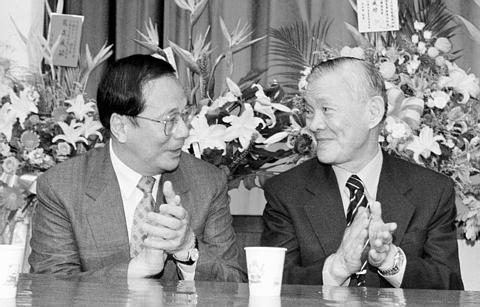Incoming Vice Premier Chang Chun-hsiung
Chang, currently secretary-general to the Presidential Office, said that the two areas have been the targets of public criticism since the new government was formed more than two months ago.
"We'll learn the lessons from the painful experiences and failures of the past to start anew," Chang said.

PHOTO: SUNG CHI-HSIUNG, LIBERTY TIMES.
He said the Executive Yuan would better coordinate its financial policies, which have already gained a reputation for their inconsistency.
In addition, the Executive Yuan would strengthen its communication with lawmakers in order to win their support, Chang said.
Chang made the remarks while visiting the Legislative Yuan to meet lawmakers, the day after his appointment to the vice-premiership was announced.
During the visit, Chang met Legislative Yuan speaker Wang Jin-pyng
Chang will take over the post left vacant by Yu Shyi-kun, who stepped down on Tuesday to take responsibility for last Saturday's Pachang Creek
Chang's credentials as a former legislator who is familiar with the workings of the Legislative Yuan are widely believed to be a major factor behind his appointment to the post.
Opposition lawmakers, however, were not optimistic about the prospects of improved relations between the legislature and the Cabinet, despite Chang's reputation as a skilled communicator.
"Structurally speaking, the DPP holds only one-third of the legislative seats, which is insufficient for it to secure dominance over the implementation of policy," said Lai Shyh-bao (
Lai said the search for a replacement for Yu would have been a good opportunity for President Chen Shui-bian
"It is regrettable that the Executive Yuan lost a chance to steady its power base," Lai said.
Chen Chao-jung (
"President Chen even criticized lawmakers as a mouthpiece for the Chinese communists, creating tensions with the legislature," Chen said.
And the question of whether Premier Tang Fei (
Because Tang had previously said he preferred a candidate with a strong background in finance, the appointment of someone with little financial experience was evidence that Chen is choosing the Cabinet's personnel -- and not Tang, the lawmakers argued.
"Chang's credentials are apparently inconsistent with those you claimed to seek," said New Party legislator Cheng Long-shui
But Tang said Cheng's observation was incorrect. "I was picking the most suitable person to do the job. [Chang] was my own first choice," the premier said.
The lawmakers also questioned whether the vice premier would become a stronger figure than the premier, saying that Chang, like Yu, was sent by Chen to act as the president's representative.
Tang dismissed the suggestion as meaningless speculation.
Chang, meanwhile, said his job was to assist Tang -- not replace him.
"Tang's continuation as premier is the factor most crucial to the attainment of political stability," Chang said. "He is irreplaceable."

Taiwan is gearing up to celebrate the New Year at events across the country, headlined by the annual countdown and Taipei 101 fireworks display at midnight. Many of the events are to be livesteamed online. See below for lineups and links: Taipei Taipei’s New Year’s Party 2026 is to begin at 7pm and run until 1am, with the theme “Sailing to the Future.” South Korean girl group KARA is headlining the concert at Taipei City Hall Plaza, with additional performances by Amber An (安心亞), Nick Chou (周湯豪), hip-hop trio Nine One One (玖壹壹), Bii (畢書盡), girl group Genblue (幻藍小熊) and more. The festivities are to

Auckland rang in 2026 with a downtown fireworks display launched from New Zealand’s tallest structure, Sky Tower, making it the first major city to greet the new year at a celebration dampened by rain, while crowds in Taipei braved the elements to watch Taipei 101’s display. South Pacific countries are the first to bid farewell to 2025. Clocks struck midnight in Auckland, with a population of 1.7 million, 18 hours before the famous ball was to drop in New York’s Times Square. The five-minute display involved 3,500 fireworks launched from the 240m Sky Tower. Smaller community events were canceled across New Zealand’s

The Ministry of Foreign Affairs (MOFA) yesterday said it is closely monitoring developments in Venezuela, and would continue to cooperate with democratic allies and work together for regional and global security, stability, and prosperity. The remarks came after the US on Saturday launched a series of airstrikes in Venezuela and kidnapped Venezuelan President Nicolas Maduro, who was later flown to New York along with his wife. The pair face US charges related to drug trafficking and alleged cooperation with gangs designated as terrorist organizations. Maduro has denied the allegations. The ministry said that it is closely monitoring the political and economic situation

‘SLICING METHOD’: In the event of a blockade, the China Coast Guard would intercept Taiwanese ships while its navy would seek to deter foreign intervention China’s military drills around Taiwan this week signaled potential strategies to cut the nation off from energy supplies and foreign military assistance, a US think tank report said. The Chinese People’s Liberation Army (PLA) conducted what it called “Justice Mission 2025” exercises from Monday to Tuesday in five maritime zones and airspace around Taiwan, calling them a warning to “Taiwanese independence” forces. In a report released on Wednesday, the Institute for the Study of War said the exercises effectively simulated blocking shipping routes to major port cities, including Kaohsiung, Keelung and Hualien. Taiwan would be highly vulnerable under such a blockade, because it